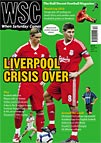 The Andorra national team faces a number of challenges, from a lack of players to grumpy British pundits. James Calder explains
The Andorra national team faces a number of challenges, from a lack of players to grumpy British pundits. James Calder explains
Andorra’s latest stab at World Cup qualifying was a familiar exercise in damage limitation, the principality’s low expectations largely being met when they failed to pick up a single point in finishing bottom of Group Six.
Mindful of his side’s weaknesses and dispensing with attacking players, coach David Rodrigo put his faith in a notional 4-5-1 formation, hoping to snatch a point or two against Belarus and Kazakhstan. The bus-parking tactic worked just fine five years ago, when the minnows from the eastern Pyrenees mugged an unsuspecting Macedonia side to record what remains their only competitive victory in over a decade of trying. Yet aside from coming within 11 minutes of a home draw against Belarus and keeping England at bay in a soporific first half in Barcelona, the Andorrans never looked like exceeding their limited aims. Another pointless campaign, their fifth in six attempts, ended predictably with a 6-0 hammering at the hands of a demob-happy Ukraine side bound for the play-offs.
It is hard not to sympathise with Rodrigo’s plight. Hampered by the retirement of a clutch of experienced players and the corruption-related decline of the principality’s only Spanish league club, FC Andorra, the former games teacher has little room for manoeuvre, particularly with barely 500 amateur players to call on and just two professionals, Ildefons Lima and Marc Bernaus.
In his ten years in the job Rodrigo has developed a prickly line of self-defence and a dislike of journalists who question his ultra-defensive tactics, repeatedly stressing that “moral victories” are all he can hope to achieve with such paltry resources. His competitive record of 54 defeats, two draws and that solitary victory over the Macedonians seems to bear out that argument.
Detractors in the press point to his reluctance to field forwards such as Portuguese-born winger Victor Hugo, the player of the year in last season’s Lliga Nacional, and Barcelona youth graduate Daniel Mejías. Yet, as recently retired midfielder Justo Ruiz points out, adopting a more offensive approach against superior opposition makes little sense. “Andorra can’t hope to play the likes of England at their own game. There’s a gulf between us in terms of fitness and technique and we’d be committing suicide if we tried to do that.”
Acknowledging the national side’s plight, the Andorran FA (FAF) even went to the length of secretly paying out bonuses to the players in a bid to keep scores respectable. Under the sliding scale system, as well as receiving a fee of approximately €500 (£451) for turning up, the players were paid €200 for 3-0 defeats, with the figure rising to €400 for a 1-0 defeat. Details of the payments were leaked by an unnamed player to national daily Diari d’Andorra in December 2007, prompting mild indignation in the press and their withdrawal by the FAF, who nevertheless pointed to the side’s improved record under the system.
Given such fatalistic initiatives, it is perhaps not surprising that the national side’s efforts are met with apathy by the country’s football followers, most of whom choose to keep tabs on Barcelona and Real Madrid instead. Home games at the unprepossessing Estadi Comunal attract attendances that would disappoint most Scottish third division sides. And in recent times the footballers have suffered in comparison to the rugby team, who at least offer realistic hope of sporadic international success, as they showed in comfortably beating Armenia in the European Nations Cup in March.
The object of indifference at home, the Andorrans are perceived as little more than an unwelcome distraction on their travels. Ambling on to the pitch for a half-time presentation in London in June, Jimmy Greaves questioned their very presence when he asked: “Have you ever seen a team this bad at Wembley?”
To Ruiz the chance to rub shoulders with the Premier League’s finest is what drives the side. “My friends used to say we should only face smaller teams but where’s the motivation in just playing the Faroe Islands? We enjoy the chance to come up against the likes of Frank Lampard and Andriy Shevchenko and I’d rather go to Wembley and get hammered than draw 0-0 with San Marino.”
“When you play against England you feel like you’re a professional footballer, if only for a week,” he continues. “You get to do interviews and as a player you enjoy all that. I understand why big teams see us as a pain but at the same time they still have to go out and beat us. After all, we’ve held England until half time on two occasions now.” As long as they continue to subsist on such meagre pickings, the Andorrans will be around to annoy Greavsie and his ilk for some time yet.
From WSC 274 December 2009